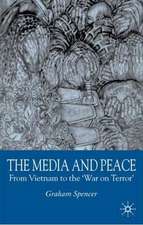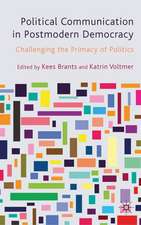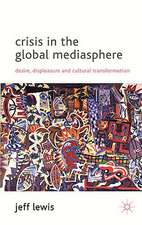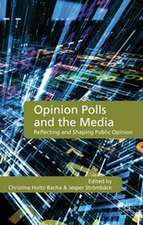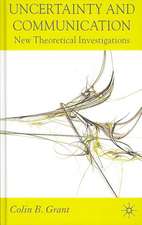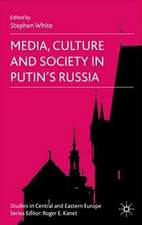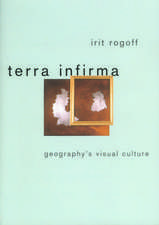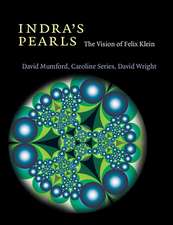Understanding Cultural Taste: Sensation, Skill and Sensibility
Autor David Wrighten Limba Engleză Hardback – 27 iul 2015
Preț: 582.80 lei
Preț vechi: 685.65 lei
-15% Nou
Puncte Express: 874
Preț estimativ în valută:
111.55€ • 121.21$ • 93.77£
111.55€ • 121.21$ • 93.77£
Carte tipărită la comandă
Livrare economică 21 aprilie-05 mai
Preluare comenzi: 021 569.72.76
Specificații
ISBN-13: 9781137447067
ISBN-10: 1137447060
Pagini: 188
Ilustrații: VIII, 188 p.
Dimensiuni: 140 x 216 x 18 mm
Greutate: 0.39 kg
Ediția:1st ed. 2015
Editura: Palgrave Macmillan UK
Colecția Palgrave Macmillan
Locul publicării:London, United Kingdom
ISBN-10: 1137447060
Pagini: 188
Ilustrații: VIII, 188 p.
Dimensiuni: 140 x 216 x 18 mm
Greutate: 0.39 kg
Ediția:1st ed. 2015
Editura: Palgrave Macmillan UK
Colecția Palgrave Macmillan
Locul publicării:London, United Kingdom
Cuprins
Introducing Taste
1. Theorizing Taste
2. Measuring Taste
3. Governing Tastes
4. Globalizing Tastes
5. Producing Tastes
6. Digitalizing Tastes
Conclusion: Dimensions of Taste
1. Theorizing Taste
2. Measuring Taste
3. Governing Tastes
4. Globalizing Tastes
5. Producing Tastes
6. Digitalizing Tastes
Conclusion: Dimensions of Taste
Recenzii
"This is a great book. David Wright explores and questions the assumptions which shape much social scientific discussion of taste, and then transcends them. He reflects upon the context of social scientific engagement with taste, and then both considers how that context is changing and what we need to do to keep up. The result is a fascinating book which should be essential reading for anybody thinking about or researching taste." - Nick Crossley, University of Manchester, UK
"In this highly engaging book, David Wright offers a wealth of informed and decidedly contemporary insights into the state of play in debates about cultural taste and its social significance. While the book's merits are numerous, especially impressive is the way it manages to tease out the contingencies and complexities of attempts to understand and interpret taste in the twenty-first century, while at the same time providing a compelling account of why and how taste remains a matter of enduring concern for questions about struggle, power and inequality." - Mark Rimmer, University of East Anglia, UK
"This book is a compelling invitation to think critically about taste, from the implications of linking literacy to citizenship, to the repercussions of Amazon's predictive algorithms. Wright provides an utterly absorbing account of the infrastructure behind the making, measuring and mobilizing of tastes. His masterful overview spans early modernity to the age of Big Data, and places the reader at the cutting edge of debates about taste and why it matters, perhaps more than ever, in a culture of abundance." - Jennifer Smith Maguire, University of Leicester, UK
"In this highly engaging book, David Wright offers a wealth of informed and decidedly contemporary insights into the state of play in debates about cultural taste and its social significance. While the book's merits are numerous, especially impressive is the way it manages to tease out the contingencies and complexities of attempts to understand and interpret taste in the twenty-first century, while at the same time providing a compelling account of why and how taste remains a matter of enduring concern for questions about struggle, power and inequality." - Mark Rimmer, University of East Anglia, UK
"This book is a compelling invitation to think critically about taste, from the implications of linking literacy to citizenship, to the repercussions of Amazon's predictive algorithms. Wright provides an utterly absorbing account of the infrastructure behind the making, measuring and mobilizing of tastes. His masterful overview spans early modernity to the age of Big Data, and places the reader at the cutting edge of debates about taste and why it matters, perhaps more than ever, in a culture of abundance." - Jennifer Smith Maguire, University of Leicester, UK
Notă biografică
David Wright teaches in the Centre for Cultural Policy Studies at the University of Warwick, UK and has interests in popular culture, cultural work and the politics of cultural participation. He was a Research Fellow at CRESC, based at the Open University, and a co-author of Culture, Class, Distinction (2009).


